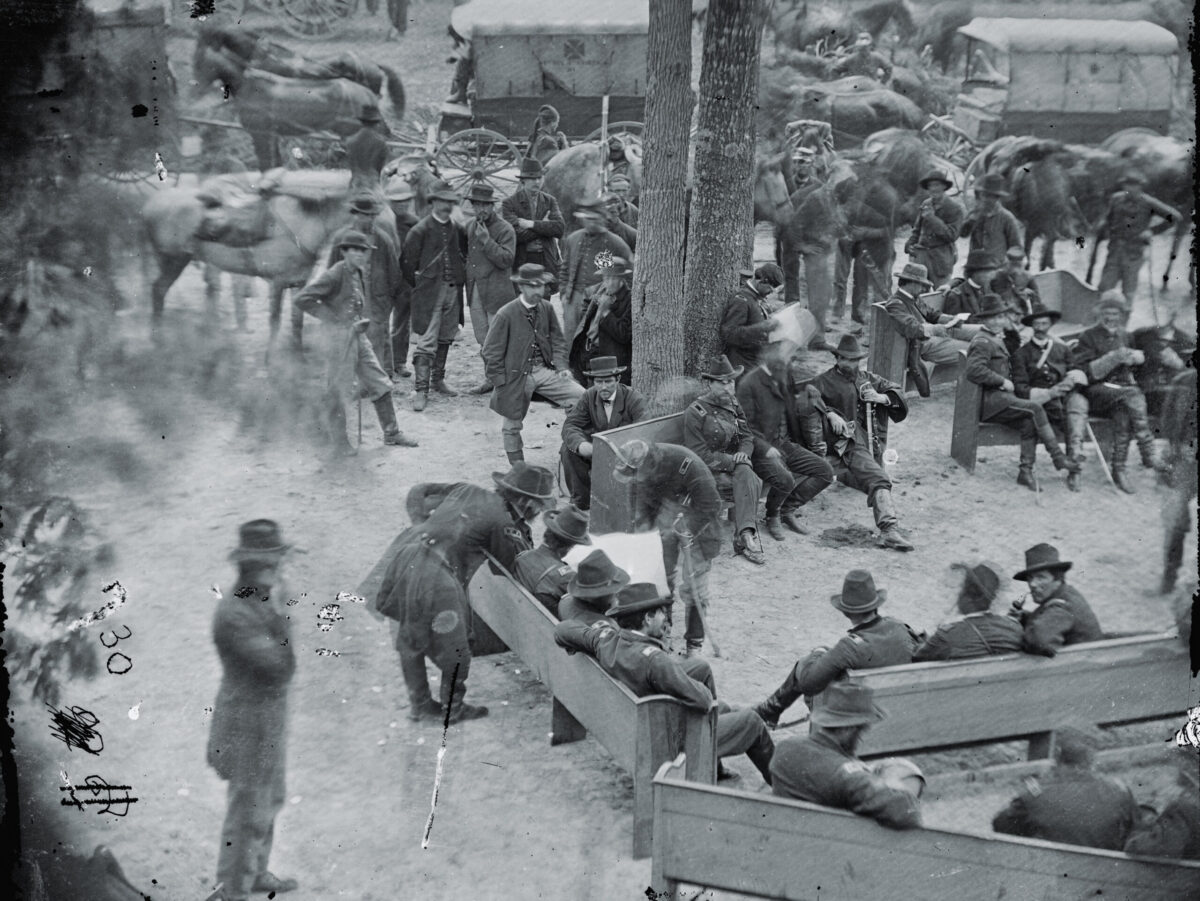Union General Ulysses S. Grant was famous for being a man of few words. When he was president of the United States, he was asked what his favorite songs were. “I only know two,” he responded. “One is ‘Yankee Doodle Dandy,’ and the other isn’t.”
Given his lifelong reticence, it is not surprising that Grant did not much cotton to councils of war. “Councils of war do not fight,” he observed, repeating a favorite West Point adage.
In the famous sequence of photographs taken by Timothy O’Sullivan at Massaponax Baptist Church in Virginia on May 21, 1864, O’Sullivan confidently described the action he had observed as a council of war. Considering that his photographs do depict Grant and Maj. Gen. George Gordon Meade looking at a map together, after which Grant returns to his seat and writes something down on a piece of paper, O’Sullivan could be forgiven for believing that he had observed just such a council taking place.
But Grant’s aide, Colonel Horace Porter, who was there that day sitting at the end of the bench on which Meade was sitting, pointedly disputed O’Sullivan’s claim. In his postwar book, Campaigning with Grant, Porter included a lengthy quote from Grant regarding councils of war.
“It was suggested, one evening, that he [Grant] instruct Sherman to hold a council of war on the subject of the next movement of his army,” Porter wrote. “To this General Grant replied, ‘No, I will not direct anyone to do what I would not do myself under similar circumstances. I never held what might be called formal councils of war, and I do not believe in them. They create a divided responsibility, and at times prevent that unity of action so necessary in the field. Some officers will in all likelihood oppose any plan that may be adopted; and when it is put into execution, such officers may, by their arguments in opposition, have so far convinced themselves that the movement will fail that they cannot enter upon it with enthusiasm, and might possibly be influenced in their actions by feeling that a victory would be a reflection on their judgment. I believe it is better for a commander charged with the responsibility of all operations of his army to consult his generals freely, but informally, get their views and opinions, and then make up his mind what action to take, and act accordingly. There is too much truth in the old adage: Councils of war do not fight.'”
Porter’s book has been criticized for being less than completely accurate, and certainly Grant’s speech seems a bit long-winded for the taciturn general. But Porter’s basic view of Grant’s aversion to councils of war was independently verified in a book written by another traveling companion of Grant’s–this time a peacetime traveler–New York newspaperman John Russell Young. In his two-volume book Around the World with General Grant, Young recounted a conversation with the globe-trotting general aboard the steamship Irrawady between Saigon and Hong Kong in April 1879.
“Some remark was made about councils of war,” Young wrote, “and how far their deliberations affected an army’s movements. ‘I never held a council of war in my life [Grant is quoted as saying]. I never heard of Sherman or Sheridan doing so. Of course I heard all that everyone had to say, and in headquarters there is an interesting and constant stream of talk. But I always made up my mind to act, and the first that even my staff knew of any movement was when I wrote it in rough and gave it to be copied off. It is always safe in war to keep your own counsel. No man living ever knew what my plans and campaigns would be until they were matured. My orders were generally written in my own handwriting. I never even told General Rawlins until they were given to him to be copied out. I was always talking and conferring with generals and hearing what one would say and another, but the decision was always my own.'”
Grant’s reticence to discuss his plans ahead of time was much appreciated by his commander in chief. President Abraham Lincoln had frequently been disappointed in his choice of generals, some of whom had been so reluctant to fight that Lincoln had been obliged to take a more direct role in the conduct of a campaign. In Grant, he had finally found an officer who could handle things himself.
In a letter to Grant on the eve of the Overland campaign, Lincoln made it clear that he approved of Grant’s independent style. “I wish to express,” wrote Lincoln, “my entire satisfaction with what you have done up to this time, so far as I understand it. The particulars of your plans I neither know, or seek to know.”
Lincoln reiterated his satisfaction to his secretary, William O. Stoddard. Calling Grant “the quietest little fellow you ever saw,” Lincoln said approvingly, “He hasn’t told me what his plans are. I don’t know, and I don’t want to know. I’m glad to find a man who can go ahead without me.”
In other words, one whose only councils of war were with himself.
This article originally appeared in America’s Civil War.





